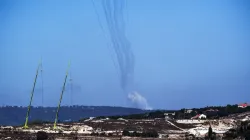Hezbollah loses another senior commander, vows to keep striking Israel as tensions escalate
Hezbollah's acting leader Naim Qassem said even more Israelis would be displaced as it kept up its rocket fire into Israel amid escalating tensions. Hezbollah has also lent tacit support to ceasefire efforts in Lebanon, as Israeli strikes have eliminated most of its top command.

Beirut: The Iran-backed Hezbollah group in Lebanon remains defiant in the face of Israeli incursions and airstrikes by saying that even more Israelis will be displaced as the militant group extends its rocket fire deeper into the Jewish state. Hezbollah's acting leader Naim Qassem said its military capabilities are still intact and that it has replaced all of its senior commanders after weeks of heavy Israeli airstrikes across large parts of Lebanon that killed most of its top command.
He also said Israeli forces have not been able to advance after launching a ground incursion into Lebanon last week. The Israeli military said a fourth division is now taking part in the incursion, which has expanded to the west, but operations still appear to be confined to a narrow strip along the border.
Meanwhile, the Israeli military said it has dismantled militant infrastructure along the border and killed hundreds of Hezbollah fighters. It said a strike in Beirut killed Suhail Husseini, who it described as a senior commander responsible for overseeing logistics, budget and management of the militant group. There was no immediate comment from Hezbollah.
Hezbollah's top commanders replaced: Qassem
“We are firing hundreds of rockets and dozens of drones. A large number of settlements and cities are under the fire of the resistance,” Qassem said in a video address, speaking from an undisclosed location. “Our capabilities are fine and our fighters are deployed along the frontlines."
He said Hezbollah's top leadership was directing the war and that the commanders killed by Israel have been replaced. He also said that Hezbollah will name a new leader to succeed Hassan Nasrallah, who was killed in an Israeli airstrike in a bunker in Beirut last month, “but the circumstances are difficult because of the war.”
This comes as Hezbollah is putting up a defiant fight against Israel as the IDF said 85 projectiles were launched from Lebanon toward northern Israel in a significant burst of fire on Tuesday. Israel's aerial defence intercepted most of the rockets, the military said. The IDF also said that it struck Hezbollah targets in the southern Beirut suburbs, known as the Dahiyeh, where the militant group is headquartered.
Hezbollah supports ceasefire efforts
However, Qassem said he supported attempts to secure a truce, and for the first time did not mention the end of war in Gaza as a pre-condition to halting combat on the Lebanon-Israel border. Qassem said Hezbollah supported attempts by Speaker of Parliament Nabih Berri, a Hezbollah ally, to secure a halt to fighting, although it was not clear whether this signalled a change in stance.
"We support the political activity being led by Berri under the title of a ceasefire," Qassem said in his 30-minute televised address. His televised address comes 11 days after the killing of Nasrallah, the most devastating setback Israel has dealt its foe in decades.
Further extending Hezbollah's troubles, Israeli Defence Minister Yoav Gallant said it appeared the replacement for Nasrallah had been "eliminated". Hashem Safieddine, a top Hezbollah official, was widely expected to succeed Nasrallah. Safieddine has not been heard from publicly since an Israeli airstrike late last week.
Iran's warning to Israel
The regional tensions triggered a year ago by the Palestinian armed group Hamas's attack on southern Israel have spiralled to a string of Israeli operations by land and air over Lebanon and direct attacks by Iran onto Israeli military installations. Iran warned Israel on Tuesday against any attacks on the Islamic Republic, a week after Tehran fired a barrage of missiles on it, putting the Middle East on edge.
Any attack on Iran's infrastructure will be met with retaliation, Foreign Minister Abbas Araqchi said, warning Israel against attacks on his country. Araqchi will visit Saudi Arabia and other countries in the Middle East starting on Tuesday to discuss regional issues and work on stopping Israel's "crimes" in Gaza and Lebanon, Iran's IRNA news agency reported.
Gulf states have sought to reassure Iran of their neutrality in the Iran-Israel conflict, sources told Reuters last week. In Lebanon, the Israeli military piled more pressure on Lebanon's Iran-backed Hezbollah, saying it was conducting "limited, localized, targeted operations" in Lebanon's southwest after announcing such operations for the southeast border area. Israel's military struck Beirut's southern suburbs overnight and said it killed a senior Hezbollah responsible for the group's budgeting and logistics.
(with inputs from agencies)
ALSO READ | Israel launches ground operations in southwest Lebanon as Iran delivers warning
